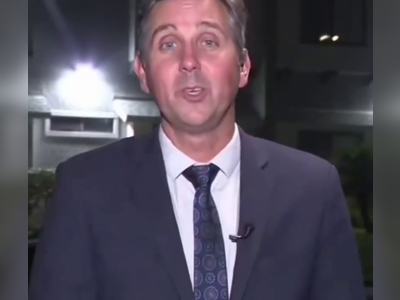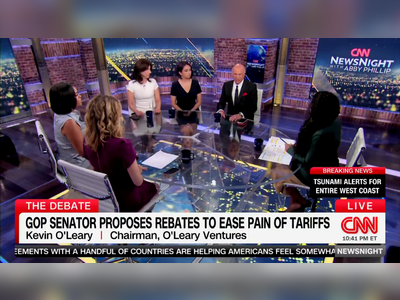Moody's Downgrades US Credit Rating Amid Rising Fiscal Concerns
US government debt faces increased scrutiny as Moody's lowers rating to AA1, highlighting growing deficits and political stagnation.
The United States government debt is expected to encounter heightened scrutiny following Moody’s recent downgrade of the nation's credit rating from the top-tier triple-A to AA1.
This decision, which took place last Friday, reflects increasing worries regarding the US's fiscal health amid swelling national debt, currently estimated at $36 trillion.
Moody’s cited a worsening budget deficit and a lack of bipartisan agreement on fiscal policy as primary reasons for the downgrade.
The agency expressed concerns that the budget deficit is likely to continue rising, primarily due to stagnant government revenue juxtaposed with increasing entitlement expenditures.
In its analysis, Moody’s emphasized the failure of successive administrations and Congress to implement measures aimed at curtailing large annual deficits and containing growing interest costs.
The downgrade by Moody’s arrives at a time when proposed fiscal policies, such as cuts to taxes, have raised alarms among economists who fear a further increase in the budget deficit.
Despite this, US Treasury Secretary Scott Bessent downplayed the significance of the downgrade, labeling it a 'lagging indicator' during an appearance on NBC's 'Meet the Press'.
Market analysts exhibited mixed reactions to the downgrade.
While some investors remained optimistic that it would not significantly affect the market, others warned of potential increases in Treasury yields.
Currently, the yield on 10-year Treasury bonds has approached 4.5%, reflecting a general decline in prices over recent years.
Tracy Chen, a portfolio manager at Brandywine Global Investment Management, noted that demand for higher yields on Treasuries might emerge as a result of the downgrade.
Furthermore, historical comparisons indicate that the last major downgrade in 2011 led to substantial market declines, while a similar incident in 2023, when Fitch adjusted its rating to AA+, also resulted in market unrest.
In contrast, recent market activity following Moody’s announcement suggested only a minor shift in investor sentiment, with indices like Nasdaq futures showing minimal declines.
Industry experts also weighed in on potential ramifications for banks and the financial system at large.
Toby Nangle, a former head of asset allocation at Columbia Threadneedle, stated that since regulators do not typically differentiate between AAA and AA1 ratings for capital risk calculations, the downgrade might not significantly affect banks’ balance sheets.
In light of the downgrade, some analysts expressed the view that the US's unique position as the issuer of the world's primary reserve currency mitigates the risk of default.
Stephen Innes, managing partner at SPI Asset Management, highlighted the government's ability to manage its debt obligations through the issuance of currency it controls.
Amidst the economic discourse, the White House communications director, Steven Cheung, criticized the credibility of the Moody's rating, suggesting a political bias from an economist linked to previous Democratic administrations.
However, this assertion focused more on the individual economist rather than the broader rating agency.
As the situation unfolds, market observers continue to monitor the fiscal developments in Washington, particularly the dynamics of ongoing debt discussions and their implications for US creditworthiness.
This decision, which took place last Friday, reflects increasing worries regarding the US's fiscal health amid swelling national debt, currently estimated at $36 trillion.
Moody’s cited a worsening budget deficit and a lack of bipartisan agreement on fiscal policy as primary reasons for the downgrade.
The agency expressed concerns that the budget deficit is likely to continue rising, primarily due to stagnant government revenue juxtaposed with increasing entitlement expenditures.
In its analysis, Moody’s emphasized the failure of successive administrations and Congress to implement measures aimed at curtailing large annual deficits and containing growing interest costs.
The downgrade by Moody’s arrives at a time when proposed fiscal policies, such as cuts to taxes, have raised alarms among economists who fear a further increase in the budget deficit.
Despite this, US Treasury Secretary Scott Bessent downplayed the significance of the downgrade, labeling it a 'lagging indicator' during an appearance on NBC's 'Meet the Press'.
Market analysts exhibited mixed reactions to the downgrade.
While some investors remained optimistic that it would not significantly affect the market, others warned of potential increases in Treasury yields.
Currently, the yield on 10-year Treasury bonds has approached 4.5%, reflecting a general decline in prices over recent years.
Tracy Chen, a portfolio manager at Brandywine Global Investment Management, noted that demand for higher yields on Treasuries might emerge as a result of the downgrade.
Furthermore, historical comparisons indicate that the last major downgrade in 2011 led to substantial market declines, while a similar incident in 2023, when Fitch adjusted its rating to AA+, also resulted in market unrest.
In contrast, recent market activity following Moody’s announcement suggested only a minor shift in investor sentiment, with indices like Nasdaq futures showing minimal declines.
Industry experts also weighed in on potential ramifications for banks and the financial system at large.
Toby Nangle, a former head of asset allocation at Columbia Threadneedle, stated that since regulators do not typically differentiate between AAA and AA1 ratings for capital risk calculations, the downgrade might not significantly affect banks’ balance sheets.
In light of the downgrade, some analysts expressed the view that the US's unique position as the issuer of the world's primary reserve currency mitigates the risk of default.
Stephen Innes, managing partner at SPI Asset Management, highlighted the government's ability to manage its debt obligations through the issuance of currency it controls.
Amidst the economic discourse, the White House communications director, Steven Cheung, criticized the credibility of the Moody's rating, suggesting a political bias from an economist linked to previous Democratic administrations.
However, this assertion focused more on the individual economist rather than the broader rating agency.
As the situation unfolds, market observers continue to monitor the fiscal developments in Washington, particularly the dynamics of ongoing debt discussions and their implications for US creditworthiness.












